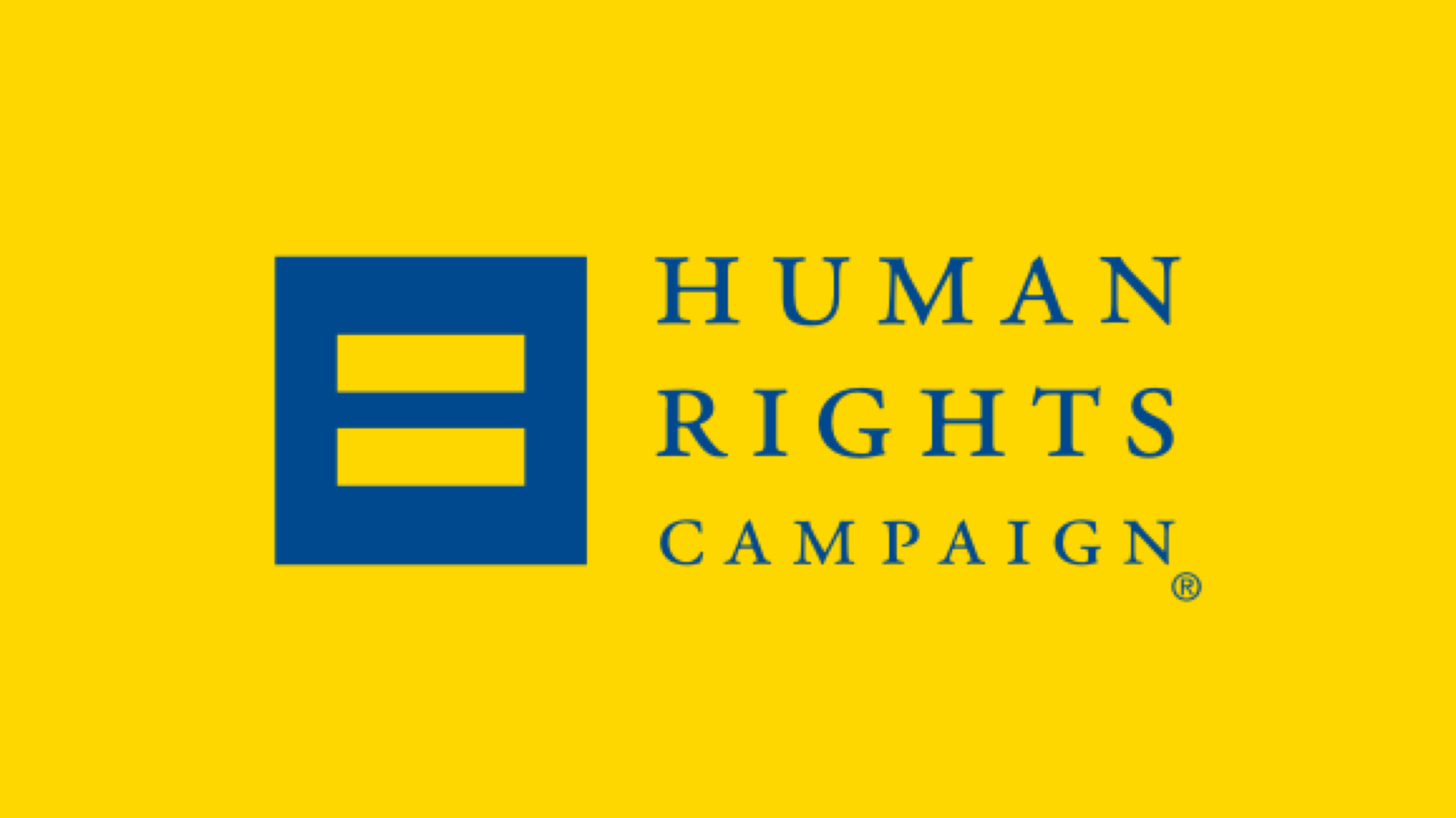Read about supporters who share in the vision of a world where lesbian, gay, bisexual, transgender and queer people plus community members who use different language to describe identity are ensured equality and embraced as full members of society at home, at work and in every community.
Densil Porteous
As a student at Kenyon College in Gambier, Ohio, Densil Porteous recalls the day HRC connected with his college campus to encourage voter turnout and immediately felt like he found a place to call home.
Read more of his story
Densil remembers how excited he was when he received his HRC membership card and when he attended his first HRC dinner. “I want to be part of this organization, the work is too important” recalls Densil, and 16 years later he is still involved, currently serving on HRC’s Board of Directors.
As a gay Black man, representation matters to Densil, especially now as a parent. He often considers the world he is leaving for his child; a place for her now and into adulthood. Densil remarked, “The legacy I leave is her legacy as well. When I am no longer here, she will be able to talk about her dad and what he did to continue his support to HRC and the LGBTQ+ community.”
While raising children can be hard, joining the Equality Circle is not. He saw the list of current members and thought, “Why are there such few names? Why aren’t there more of us here? After we are gone, we can ensure that the organization sustains. This is our legacy.” He found it easy to add HRC as a beneficiary to his estate plans, excited to support the organization even after his passing.
Densil proudly wears his Equality Circle member pin and walks into spaces with the hope of inspiring others to think about how they can also continue to support Human Rights Campaign. He hopes that others will consider joining him in the Equality Circle and providing the inspiration for the next college student who is looking for a “home.”
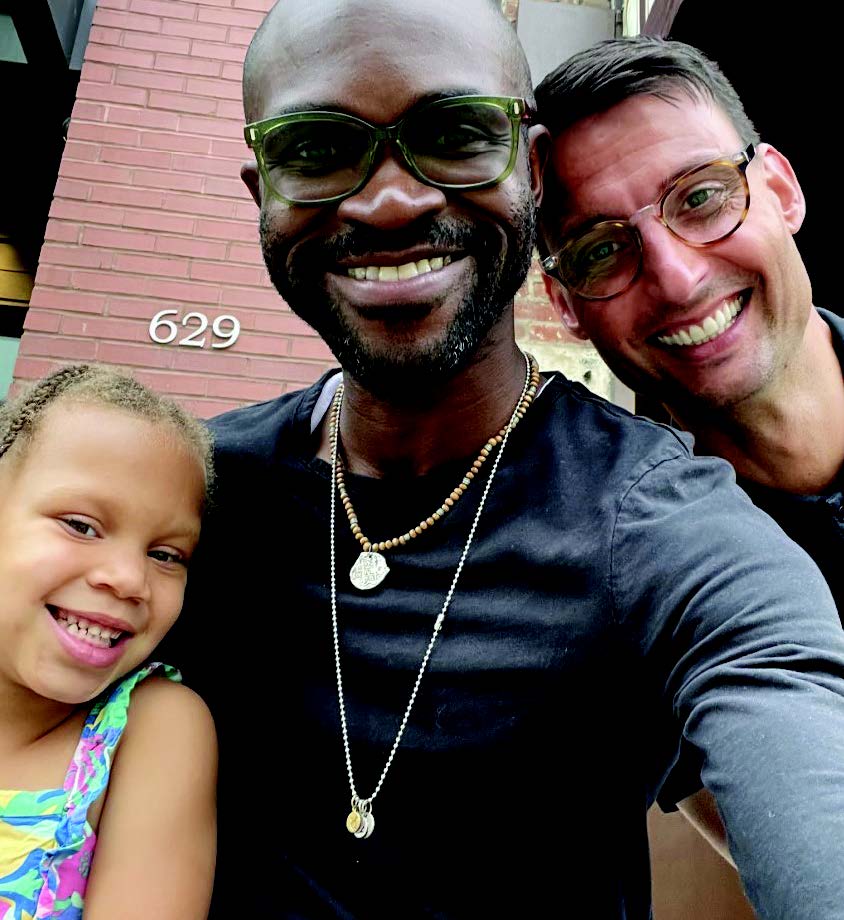
“I believe in the Human Rights Campaign so much that I want to continue to give when I am no longer here. It’s so easy to add HRC as a beneficiary in your estate plans!”
—Densil Porteous
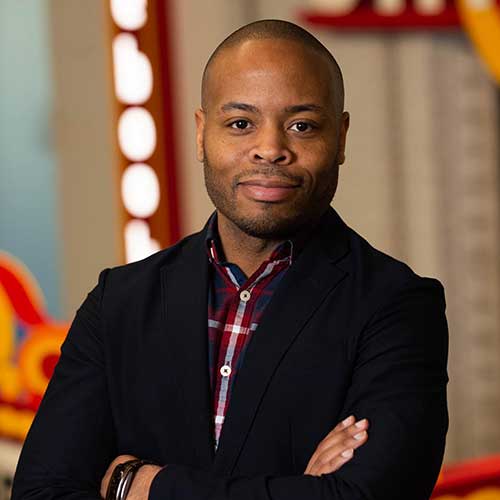
Xavier Esters
Impacting the Future of the Fight for Equality
“We have seen progress…but there is so much farther to go and I know that beyond the time that I will be here, there will still be a need for the resources, advocacy, and information that Human Rights Campaign provides.”
Read more of his story
Xavier Esters knows what it means to feel like the “other” because of his LGBTQ+ identity. He was raised in Seattle by his grandmother, and recalls being told that he was gay before he even knew what it meant. People would say things like, “he has a little sugar in his tank” – emphasizing that he was different and didn’t necessarily belong in certain spaces.
When he later moved to Charlotte, NC, Xavier found himself living in a progressive city within a conservative Southern state. It was during this time that he first became involved with HRC as a way to connect with the LGBTQ+ community.
Now residing in Chicago, where he works in Human Resources for Facebook, Xavier also serves as a member of HRC’s Board of Directors. He believes that “HRC is the most comprehensive LGBTQ+ organization” and he especially appreciates HRC’s HBCU program and transgender justice initiative.
When he decided to create his estate plans, it was a “no brainer” for Xavier to leave a gift to HRC through his will. Xavier understands that the fight for equality will continue past his lifetime, and his gift will allow HRC to continue the fight for full LGBTQ+ equality. “For those coming after me, I wanted to do what I could to make this space better for people.”
Xavier encourages others to join him as a member of HRC’s Equality Circle by leaving a gift through a will, trust, or beneficiary designation. “What is the legacy you want to leave?” Xavier asks. “How much can you attach to the potential impact you can have in the future and beyond?”
Doug Brooks
After growing up in a very conservative religious household in Indiana, where he felt forced to remain closeted, Doug Brooks later moved to Los Angeles as a young adult.
Read more of his story
In LA, Doug worked in the hospitality industry, eventually becoming the director of reservations/revenue management for Westin’s flagship Century Plaza hotel in Beverly Hills, where he oversaw many events and reservations for politicians and celebrities, including Barbra Streisand, Michael Jackson, Lucille Ball, Roy Rogers, Bob Hope, Joan Rivers, and Elizabeth Taylor. After 48 years of continuous service, Doug is currently Westin’s longest serving manager ever.
Soon after moving to LA, Doug met his partner, Ron. The couple traveled extensively together, including taking a cruise to Hawaii with Doug’s dad who eventually came to accept their relationship. Unfortunately, Ron passed away before the Obergefell decision, so Doug and Ron were never able to get married. But they built a lifetime of memories over their 44 years together.
Doug’s first experience with Human Rights Campaign was at the annual National Dinner in Washington D.C. He recalls how impressed he was with HRC’s “comprehensive approach” to LGBTQ+ rights. HRC “makes the dreams I had when I was a kid hoping for more affirmation and understanding” a reality for the LGBTQ+ youth of today.
To help ensure that HRC can continue to fight for equality, affirmation and understanding long into the future, Doug decided to include a gift to HRC through his Will. “There’s no way I would not want to leave a portion of my estate to HRC.”
Doug’s message to HRC supporters who may be considering making a gift through a Will or Trust, is that “it’s for the future of the LGBTQ+ rights movements, so that future generations can have it better than we did. It’s respecting history and respecting the future. I absolutely recommend all supporters of HRC to do it.”
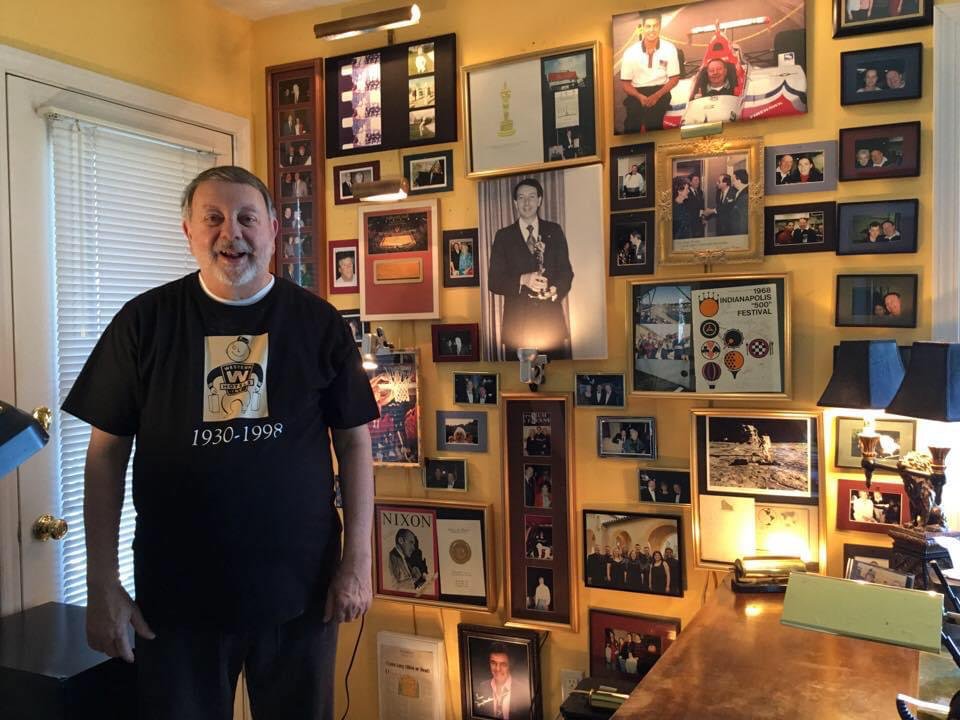
“…Tom selected HRC to receive a gift in his will. He hopes his gift will help ease the path for young people just coming out…”
—Tom Latimer
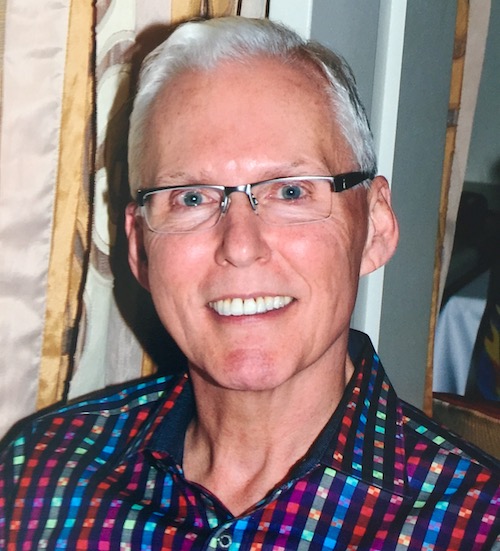
Steve Lutz
“Our opponents, the ones who would keep us in the shadows, aren’t giving up. We just have to keep preaching it from the mountain tops that we need equality for everyone,” Steve shares.
Read more of his story
Steve Lutz has been a tireless advocate for equality and social justice his whole life. Growing up in Kansas in the 1960’s, Steve remembers marching in the streets during the civil rights movement. Later, Steve attended University of Kansas, where he joined the Lawrence Gay Liberation Front shortly after the Stonewall uprising. During the AIDS epidemic, Steve lost most of his close friends, and he recalls feeling like no one in the government was fighting for LGBTQ+ rights or to end HIV/AIDS. “During that time, I recall that we had no voice in government” says Steve.
It was at that time that Steve started supporting HRC with the hope of promoting fairness and equality. He has always supported HRC’s political work, with the goal of passing federal legislation to protect the LGBTQ+ community.
Although he acknowledges that progress has been made, Steve knows that we still have a long way to go. His advice for continuing the fight is to, “Keep on keeping on. Keep pushing. We can’t give up. We can’t let up. It affects too many lives and everyone around them.” Steve admires the passion of HRC in the fight for equality and in HRC’s efforts to help pass federal legislation, like the Equality Act.
Steve supports HRC’s mission for full equality by donating through his Donor Advised Fund. He also recognizes that the fight for equality must continue for future generations, so he has included a gift to HRC through his estate plan.
His advice to others who may be in the process of creating their estate plans is to “make a list of the charities that you feel the most strongly about, that need the money to continue to work on your behalf. Then work with your advisors to help set things up. It’s just a matter of sitting down and doing it. It’s easy to put it off. My advice is: don’t put it off.”
Jennifer & Elizabeth Firth
“We need an organization that’s going to continue to fight — even after equality laws are passed,” Jennifer Firth said, “We want to help an organization that is active both politically and educationally.”
Read more of their story
Growing up in a strict, conservative family in Florida in the early 1970s, Jennifer Firth spent most of her time reading, often wanting to disappear. By the 7th grade, she was aware that the gender assigned at birth did not match how she felt or thought about herself. But, like so many others during that time period, she kept her feelings private. She didn’t know any LGBTQ+ people in her community and it wasn’t until college that she realized that she wasn’t alone.
Elizabeth Firth was raised in the South in a highly religious family during the same time and, similar to Jennifer, didn’t meet anyone else who was openly LGBTQ+ until college. Elizabeth never defined her sexuality until the term “pansexual” came into use years later.
Jennifer and Elizabeth met in Boston shortly after Jennifer graduated from college. They quickly became a couple and married in 1992.
Jennifer had a successful career designing, manufacturing and consulting on medical devices. During that time she lived a split life. In her professional life, she presented as a man; at home she lived authentically as a woman. Not expecting to be able to continue working in her career field if she transitioned, Jennifer lived like this for more than two decades. With Elizabeth’s constant love and support, Jennifer decided to transition in 2014. She was thrilled that her managers and co-workers supported her, and the women she worked with began including her in the women’s social events they organized.
At around the same time, the couple decided to include a gift to HRC in their estate plans.
“We need an organization that’s going to continue to fight — even after equality laws are passed,” Jennifer Firth said, “We want to help an organization that is active both politically and educationally.”
In addition to their generous estate gift, Jennifer and Elizabeth support HRC as annual major donors. The Firths remain optimistic about the future and hope that HRC will continue partnering with global organizations and supporting LGBTQ+ children and families.
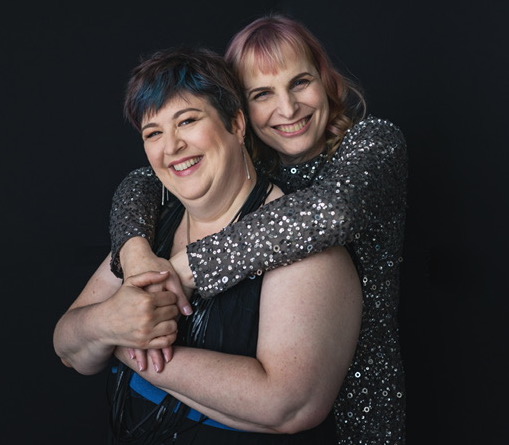
“HRC is grateful to Bob Benyo and Ray Wolf for their gift, which will be used to continue HRC’s work to ensure LGBT people and their families the right to live free of discrimination.”
—Ray Wolf and Bob Benyo
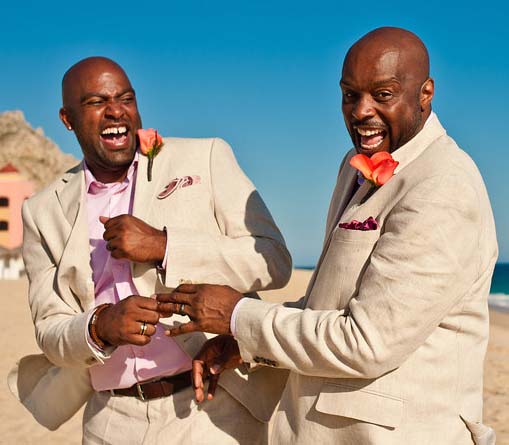
Antoine McWilliams & Michael Smith
A Legacy of Supporting LGBTQ+ Justice
When Michael Smith passed away in the summer of 2018 after a yearlong battle with lung cancer, he left money in his trust for Human Rights Campaign. “I talked with Michael about what he wanted his legacy to be,” Antoine McWilliams said. “When giving gifts [in his memory], I ask ‘Is this something that Michael would support?’”
Read more of their story
For Anthony (“Antoine”) McWilliams, his “favorite subject” is his late husband Michael Smith.
McWilliams and Smith met in 1998 — they were friends before dating and then eventually marrying. Michael was an executive at Coca-Cola for twenty-one years. Antoine was very active on the frontlines of HIV work, and that’s how they became involved in LGBTQ+ activism.
As two Black LGBTQ+ men living in the South, it was a careful dance to be more visible within the LGBTQ+ community, but through the years, they both became more comfortable and volunteered at many organizations. When Smith passed away in summer 2018 after a yearlong battle with lung cancer, he left money in his trust for Human Rights Campaign. “I talked with Michael about what he wanted his legacy to be,” McWilliams said. “When giving gifts [in his memory], I ask ‘Is this something that Michael would support?’”
They decided together to include HRC as one of the organizations that benefited from Smith’s philanthropy. Smith’s legacy of supporting LGBTQ+ justice lives on, alongside his legacy of supporting organizations that provide scholarships to youth and more.
Marilyn McConnell & Jody Gates
Aspire to Inspire
After having experienced the institutional homophobia of the South while growing up and continuing to see and experience that homophobia while they built a life together in New Orleans, Jody and Marilyn want the same important gains at home as they are seeing in other parts of the country.
Read more of their story
They both grew up in Florida—just 20 miles from each other—but Marilyn McConnell and Jody Gates didn’t meet until many years later in New Orleans, after each had pursued a career in healthcare, Marilyn as a nurse and Jody as a physician.
“There was institutionalized homophobia in Florida, and my family was no exception,” says Marilyn. “Even though we had been a couple for decades at the time of her death, our true relationship was never spoken of by my mother,” adds Jody.
The couple continued to see and experience homophobia as they built their life together in New Orleans.
“Job loss was a huge fear,” says Jody, “along with physical danger and that we could be discriminated against in housing. And of course, there was the challenge of how to represent your relationship to your family so you wouldn’t be disowned.”
To cope with these challenges, the couple stayed closeted.
“There were no out people at work,” Marilyn recalls, “and we certainly were not out to our families.” “It’s hard for young people today to imagine, but the homophobia was so pervasive that you couldn’t admit who you were even to your friends,” says Jody.
But one day Jody overheard a comment at work and realized that her staff and her patients knew she was gay. At about that same time, she attended her first women’s festival. When she got home, she felt even more keenly the oppressive feeling of being closeted, after the freedom of the festival. From that moment on, Jody stopped worrying about the consequences and the two started living openly.
At the time, the gay committee for the Mayor were having a hard time finding people to co-chair a lesbian and gay committee, so Marilyn volunteered. Marilyn and Jody both began to become more assertive in their activism and their lives. The world began to open up to them, and their increased activism led them to HRC.
“Volunteering came naturally to me,” says Marilyn. “As a child, I remember going with my grandmother to roll bandages during WWII and later volunteering as a candy striper.”
As they began to live more openly and become more personally involved, Jody and Marilyn also found they had the resources to financially support the cause of civil rights.
“Once I came out and got started openly advocating on behalf of LGBT issues, I realized how much anger I had and how much work it was going to take to make progress,” says Jody. As a southerner, Jody is often discouraged at seeing LGBT people continue to grapple with fear and discrimination at home while making important gains in other parts of the country. “You see how it is elsewhere and you want that for your community,” she says.
Marilyn agrees. “There is still so much work to be done—changing attitudes as well as laws. Organizations like HRC can do great things, but not without financial resources.”
In addition to making annual gifts, the couple have designated a gift in their wills to the HRC Foundation.
“We considered which organizations are going to be there after we’re gone and still have work to do,” Jody says. “Why wouldn’t we perpetuate the work we have championed during our lives? We want to help HRC ensure a future of full equality for all LGBT people in this country and worldwide, and to secure our progress for future generations.”
Even though they’ve come so far—in no small measure due to their own determination and activism—both women can vividly recall the fear that used to be a part of everyday life. “No one can explain to the younger generation that feeling of anxiety that never goes away, despite the progress we’ve made,” Marilyn says.
Jody and Marilyn are committed to changing the world, and have a motto that describes their philosophy: “Aspire to inspire before you expire.”
But since making their estate gift, they’ve modified that motto slightly: “Aspire to inspire after you expire.”
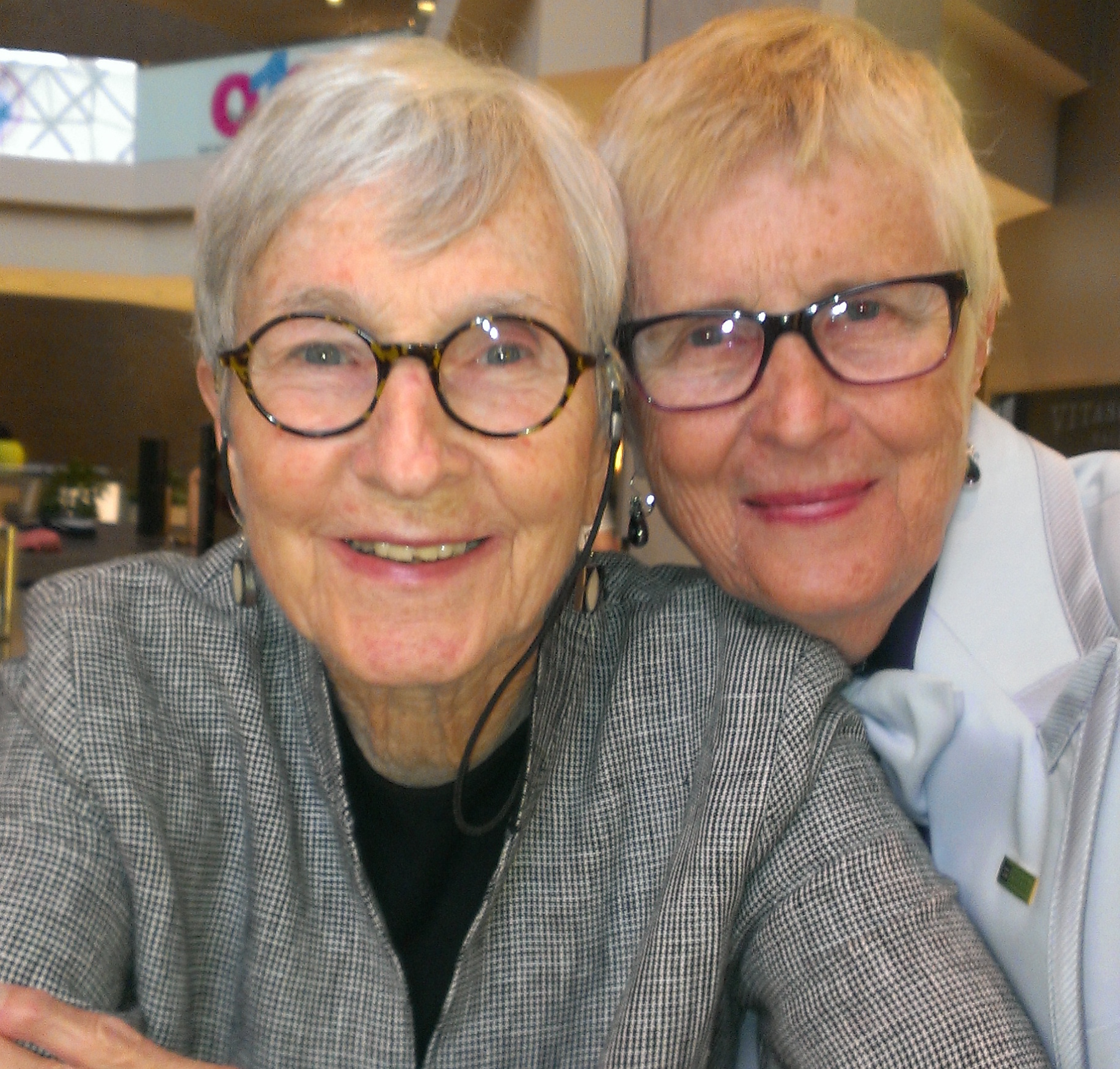
“If people just keep doing their thing unapologetically, it breaks down the barriers in more homophobic environments.”
—Reece King
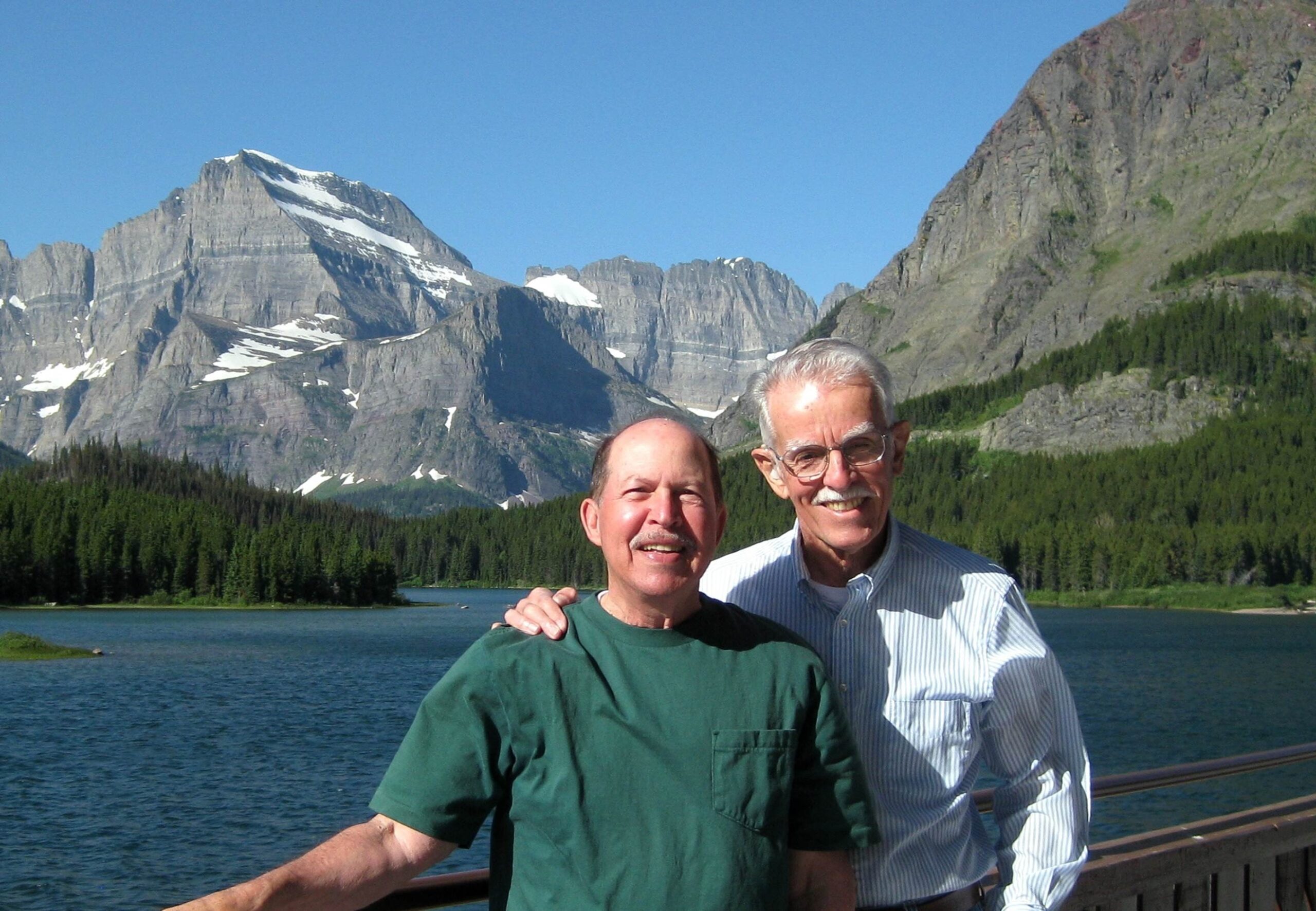
Joseph Bucuzzo and James Boone
In their 43 years together, James Boone and Joseph Bucuzzo have created a life centered on family and activism on behalf of the causes they believe in — foremost among them, improving the lives of LGBTQ+ people.
Read more of their story
In their 43 years together, James Boone and Joseph Bucuzzo have created a life centered on family and activism on behalf of the causes they believe in — foremost among them, improving the lives of LGBTQ+ people.
When he met Joseph, James was married with four children. His family needed time to adjust after he came out, but today both families — including seven wonderful grandchildren — fully accept the couple. They were married in 2014 in the backyard of their youngest son, who lives nearby.
In the early years of their relationship, James and Joseph lived in Southern California, where both men were activists. As chair of the Civil Rights Committee of the City of Irvine, James helped pass an anti-discrimination ordinance. Unfortunately, the ordinance was repealed just one year later after a nasty smear campaign. Despondent over the repeal and wanting to live in a more welcoming community, James and Joseph relocated — first to Washington state and later to Oregon, where they redoubled their efforts on behalf of LGBTQ+ people.
Over the past three decades, the couple have made financial contributions to HRC and other LGBTQ+ organizations. They recently decided to leave a gift in their wills to HRC.
“Because we are dedicated to a better future for all LGBTQ+ people, we felt a need to do more than just support HRC on a year-by-year basis,” says James. “We know that no one can predict the future, so we decided to divide our estate into five pieces — one for each child and one for the organizations we think can make the biggest impact long after we’re gone. HRC is at the top of that list. We know we can trust HRC to use our gift wisely at the time it is received.”
When asked how they decided to leave a gift in their will for HRC beyond their annual support, the couple responded without hesitation. “It was never a question for us,” Joseph says. “We don’t want to leave this earth without doing as much good as we can.”
Dr. James Kaplan
IN MEMORIAM
From Welcoming Schools to the Healthcare Equality Index, Jim understood the importance of the Human Rights Campaign Foundation’s work.
Read more of his story
Dr. James “Jim” Kaplan of Fargo, North Dakota was a dedicated supporter of HRC since 2000 and left HRC and the HRC Foundation as beneficiaries of his retirement accounts. He recently passed away and we wanted to take a moment to celebrate his life and the legacy he has left to help keep our fight for LGBTQ+ equality going strong.
Jim was described as a caring and loving person who was an avid gardener and art collector. He was a longtime member of Bethesda Lutheran Church in Moorhead, MN. As a supporter of HRC, Jim enjoyed reading about HRC’s reach locally and nationally. From Welcoming Schools to the Healthcare Equality Index, Jim understood the importance of the Human Rights Campaign Foundation’s work and wanted to ensure that it would continue into the future.
We are honored by Jim’s generous gift and hope it inspires you to consider including HRC or HRC Foundation in your own legacy.
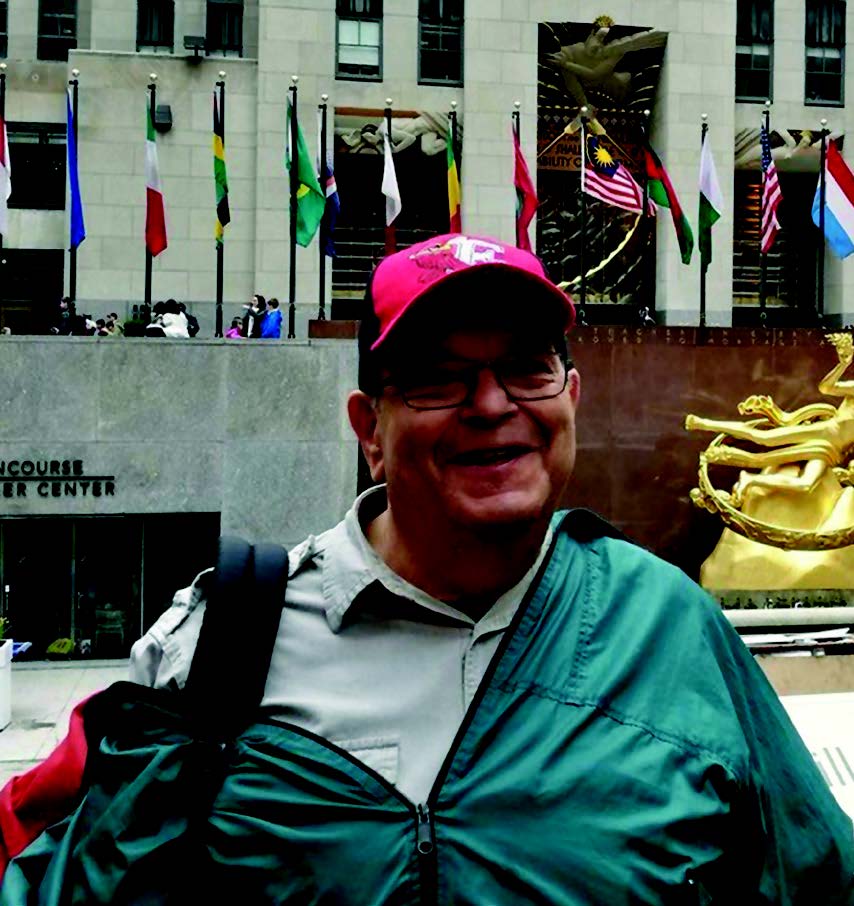
Tom Latimer
IN MEMORIAM | Leaving a Legacy for Future Generations: His Own as Well as Others
Tom Latimer knew he was gay at age 6. But he came of age at a time when being gay was something you ignored. And for many years that’s exactly what Tom did.
Read more of his story
Tom Latimer knew he was gay at age 6. But he came of age at a time when being gay was something you ignored. And for many years that’s exactly what Tom did. He married his college sweetheart, Nancy, in 1958, the same year he graduated from the University of Pittsburgh. He took a job with Gulf Oil.
In 1985, after taking early retirement from Gulf, Tom accepted a position as general manager of PR giant Hill & Knowlton’s Atlanta office. This major life change precipitated another: Tom told his wife he was gay.
“She had absolutely no idea,” Tom says. His children, both in their 20s by then, were also shocked. But all came to terms with it, and today the family, including four grandchildren, is close. Even his parents, who were not at all happy about Tom’s revelation, eventually accepted their only child for who he was.
About the time Tom came out, a generation of young men was being ravaged by a mysterious new disease called AIDS. In 1991 — after losing many friends to AIDS, including his partner of six years — Tom learned he was HIV-positive.
“I’m very fortunate,” Tom says. “Protease inhibitors have enabled me to live a long life.” Now 80, Tom has lived as an out gay man longer than he was married. He has no regrets.
“I’ve had the best of both worlds,” he says, noting that his ex-wife, a close friend, lives just 10 minutes away. “I have a wonderful family and grandkids; I’m comfortable financially and with myself. I have lots of friends. I’m incredibly lucky to have survived all these years, being gay and HIV-positive.”
Tom’s grandson, Sam, is in college, hoping to be a writer. Tom recently read a long article in the San Francisco Chronicle about men who have grown old with AIDS or HIV. Many now find themselves in tough straits because they never thought they would live this long. Tom decided to share the article with Sam and initiate a conversation about his life, thinking it could be good fodder for the aspiring writer.
“Sam learned I was gay and HIV-positive when he was 11, but we had never talked about it. It just never came up.”
Tom was extremely touched by Sam’s eloquent response. It was clear that Sam admired his grandfather and had thought deeply about Tom’s life and experience. “Knowing this about me has helped him be a better person — more tolerant and sympathetic to others,” Tom says.
Tom’s good nature and positive outlook are obvious. He cherishes his relationships with friends and family, and is sanguine about the aches and pains that come with age and living with HIV for 30+ years. And, thanks to a lifetime of hard work and the example of depression-era parents who saved religiously, he does not have to worry about money.
Tom has begun to consider his legacy and how he can have a lasting impact. Among his many philanthropic interests, Tom selected HRC to receive a gift in his will. He hopes his gift will help ease the path for young people just coming out, especially those in communities that are still working through anti-LGBTQ+ biases or whose families don’t accept their orientation or gender identity. “I want to help all the issues HRC addresses — so LGBTQ+ kids can realize what their lives could and should be,” says Tom.
Tom Latimer passed away on February 26, 2017. HRC is grateful to Tom for sharing his story and for leaving a gift to HRC in his will.

“HRC ‘makes the dreams I had when I was a kid hoping for more affirmation and understanding’ a reality for the LGBTQ+ youth of today.”
—Doug Brooks
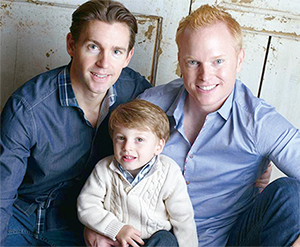
Josh and Steve
Our Vision of the Future
When Josh and Steve’s son arrived, their lives changed in countless ways. Beautiful, inspiring, gratifying ways. Today they feel more profoundly than ever about the vital importance of full equality and fundamental fairness for all people.
Read more of their story
They said, “Our vision of the future we want for our son and all children is that they are educated in welcoming schools where bullying is not tolerated and where kids can feel safe and supported when they come out.”
And so Josh and Steve have given a generous legacy gift in order to continue the march toward equality begun three decades ago by HRC.
“We want to ensure our support not just for the issues of today, but for those of tomorrow as well,” they said. “We hope you will join us.”
Becca Sherrill and LeeAnn Jones
LeeAnn Jones and Becca Sherrill are committed to changing the way LGBTQ+ people are treated so that future generations don’t face the kind of discrimination they have endured. They hope for a day when kids can come out without worrying about being beaten up at school, kicked out by their parents or rejected by their church. They hope that long-term care facilities will welcome older LGBTQ+ couples who want to keep living together.
Read more of their story
LeeAnn Jones and Becca Sherrill have been activists for lesbian, gay, bisexual and transgender equality for decades. Becca remembers marching in protest in the 1970s when Anita Bryant, the former Miss America runner-up and anti-gay spokeswoman, came to Atlanta, where they live.
LeeAnn has a long history of involvement with the Human Rights Campaign. “I was looking for a way to become more personally involved in the LGBTQ+ rights movement,” she explains. “I looked for an organization that was effective and holistic in its problemsolving. I like HRC’s broad approach — working through the legislative and executive branches, supporting fair-minded candidates and especially working at the grassroots level to change hearts and minds.”
The couple credits HRC for helping to make their recent marriage possible. “It’s something we never thought we’d have the opportunity to do,” says LeeAnn.
“When we announced our marriage, we experienced such an outpouring of support from friends and family,” LeeAnn says. “It was gratifying and wonderful to see how many people have changed their views and now accept us. But we realize that in many states, including ours, LGBTQ+ people can still be discriminated against in employment. And our state doesn’t recognize our marriage.”
LeeAnn and Becca are committed to changing the way LGBTQ+ people are treated so that future generations don’t face that kind of discrimination. They hope for a day when kids can come out without worrying about being beaten up at school, kicked out by their parents or rejected by their church. They hope that long-term care facilities will welcome older LGBTQ+ couples who want to keep living together.
Years ago, LeeAnn made HRC a beneficiary of a life insurance policy as a way of expressing her hopes for the future. Before their marriage, the two undertook a comprehensive review of their estate plans, naming loved ones and HRC as beneficiaries of a newly created trust. They see their long-term support of HRC through their estate plans as one of the best ways to ensure that their vision for the future becomes a reality.
“It took my mom a while to come around and accept me for who I am,” explains Becca. “By the time of her death, she completely embraced LeeAnn — and she fully and immediately accepted my nephew when he came out. We want the future for my nephew and my nephew’s children — should he choose to have them — to be even better.”
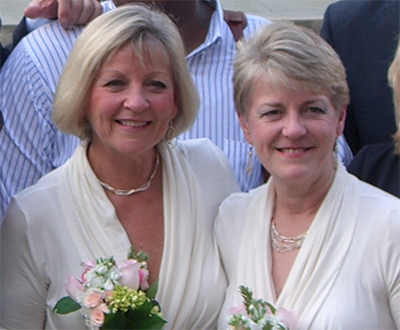
“I was looking for a way to become more personally involved in the LGBTQ+ rights movement. “I looked for an organization that was effective and holistic in its problem-solving. I like HRC’s broad approach.”
—LeeAnn Jones
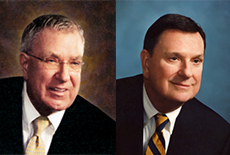
Ray Wolf and Bob Benyo
An Enduring Legacy of Love and Generosity
Beloved brothers, sons, uncles, and partners Ray Wolf and Bob Benyo shared a loving life for 48 years and, as if one could not go on without the other, died within 12 months of each other. Their legacy lives on in the lives they touched and in the generous gifts they left to support the organizations they were passionate about during their life together—including HRC.
Read more of their story
“Although he was 18 months older than me, I always treated him like a younger brother and looked out for him,” says Louise Wolf, Ray’s sister. Looking back, Louise recalls a pivotal incident when Ray was a teenager. “Ray had a part-time job at a neighborhood grocery store. We got a call that he had been taken to the hospital. It turns out he had been beaten by some of his co-workers.”
Today we would call this a hate crime. But back then, young men like Ray simply accepted their fate and moved on. Perhaps this incident planted the seed for his steadfast annual support of HRC and his decision, in consultation with Bob, to make HRC a beneficiary of the couple’s estate.
Bob Benyo also grew up in Ohio, not far from Ray—and he too enjoyed the love and devotion of a loyal sister, Roslyn Zawicki. “He was five years older than me,” says Roslyn. “He was my big brother, my hero. I looked up to him.”
According to their sisters, Bob and Ray both dated women. “As a kid, Ray adored my best friend, saying ‘Alice is the only woman I ever loved besides you,’ Louise recalls. “They were engaged for a short time, until Ray said to me, ‘I can’t do this. You know as well as I do that I’m gay.’ To his credit, he was honest with Alice and broke off the relationship.”
Then one day, Ray and Bob started showing up together at family functions. Neither sister remembers how the couple met, but they say it was obvious from the beginning that Bob and Ray were meant for each other. They courageously faced the challenges of being a gay couple in a hostile community, Louise recalls, noting “When they moved to their first home, the neighbor’s kids would harass them.” Eventually, they were able to move to a nicer area where they were accepted by their neighbors.
Ray was gregarious and social, while Bob was more reserved and private, but they shared a deep commitment to giving back to family, their communities and society. Both sisters describe their brothers as generous men who helped many people, largely behind the scenes. Ray, an optician, invited Louise to help him out in the shop to give her a break from her four children. He helped found an early version of a gay community center in Cleveland. “It was a place where men who had been ostracized by their families could gather, especially on the holidays,” Louise says. “Ray and Bob would serve dinner and be the family these young men didn’t have.”
Bob helped friends with their education and made sure his nieces and nephews attended private school. Both men were devoted to their mothers, especially after the deaths of their fathers. “Bob always felt like our parents were responsible for his education and success in life, so he wanted to repay them when he was able,” says Roslyn. “Mom will be 96 in April. Because of Bob’s generosity, she has been able to stay in her house after our father died.”
Both sisters speak lovingly of the brothers they miss so much. “I could not have imagined a better brother,” says Roslyn. Ray and Bob will be remembered by their loved ones and their HRC family.
“Losing them both was such a blow,” Louise says, “but both families are grateful that their memories will live on—beyond those they touched personally—for future generations who will benefit from their generosity.”
HRC is grateful to Bob Benyo and Ray Wolf for their gift, which will be used to continue HRC’s work to ensure LGBTQ+ people and their families the right to live free of discrimination.
Joseph Galeo
An Enduring Legacy of Love and Generosity
As much as the lives of LGBTQ+ people have changed for the better over the years, so much work remains to be done. That’s why Joseph Gale left a gift to the HRC Foundation in his estate plan—so the LGBTQ+ people of today—and tomorrow—will have an easier time than he did.
Read more of his story
Born in the late 1930s and growing up in in the 1940s and 50s, Joseph was hazed, teased and harassed in school. Like many gay men of his generation, Joseph married a woman and fathered two children before he felt safe enough to come out and live openly as a gay man. His close friend, Lloyd Kumley, believes that Joseph’s sexual orientation was behind his ex-wife’s insistence—and the court’s agreement—that Joseph have no contact with his two young sons after the divorce.
In spite of the challenges of his formative years and the disappointment of the terms of the dissolution of his marriage, Joseph had a happy life, surrounded by a wide circle of friends. He forged a successful career, first in banking and, ultimately, with the State of Oregon. He enjoyed a variety of hobbies, including playing bridge, hiking and traveling.
Joseph was also committed to doing what he could to make sure that positive change for LGBTQ+ people would continue. His friend, Lloyd, says that Joseph told him, “I know my life would have been much more pleasant had I been born 40 years later.”
Joseph attributed much of the progress made on behalf of LGBTQ+ people that he witnessed over the years to the work of HRC. After making modest contributions to HRC during his lifetime, Joseph designated the HRC Foundation to receive a portion of the funds remaining in his IRA at his death. Lloyd, explains, “Joseph left the gift to the HRC Foundation because he knew that younger generations of LGBTQ+ people benefitted from the organization’s work in ways he could only imagine as a boy and young man. It was his hope that the organization’s work continue for future generations.”
Sadly, we were unaware of Joseph’s generosity until his death so we had no opportunity to say “thank you.” We’re saying “thank you” now, in this public forum. For Joseph Gale and all the other unsung heroes who have suffered because of their sexual orientation and who are committed to making a difference—now and for future generations.
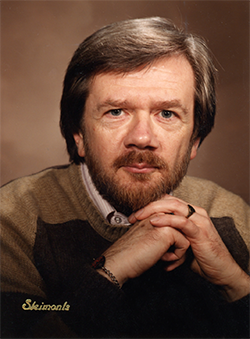
“We want to help HRC ensure a future of full equality for all LGBTQ+ people in this country and worldwide, and to secure our progress for future generations.”
—Jody Gates
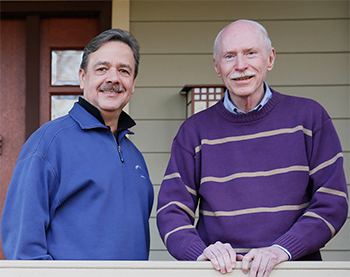
Dan Guio with partner Wayne Reeves
The next time that someone tells you the fight for equality is over, tell them the story of Dan Guio. They’ll learn that good people are still being hurt — profoundly hurt — by a lack of full equality, and that important fights are yet to be won.
Read more of their story
Dan was lucky enough to gain an entry level position at an insurance company in Indianapolis. His hard work over the years paid off when Dan was rewarded with more responsibility and began to rise through the ranks of the company.
The first and second time he was passed over to replace his boss — the vice president of human resources, Dan thought he just needed to work harder to improve his skills and spend even more time on the job.
So Dan dutifully redoubled his effort, continuing to focus on self-improvement. When it came time to take the Human Resources Certification Institute accreditation exam, he received the highest score ever recorded in the state of Indiana — so high that Dan was granted “Life” standing, which is rarely done. Dan continued to be active in the state professional society, ultimately becoming president of the Indiana Society for Human Resource Management.
During his career the vice president of human resources position opened up two more times, a few years apart. Unbelievably, Dan was passed over both times although his responsibilities had grown.
In 25 years with the company, Dan had never discussed his sexual orientation at the office. He didn’t even feel comfortable having a photo of his partner of 20 years, Wayne, on his desk. But Dan began to suspect he was being discriminated against because of his sexual orientation — a view confirmed by an organizational psychologist who often did consulting for the company.
“He told me, ‘What I’m about to say is totally off the record,’” says Dan. “’But if you want the job the next time it comes around, you need to find yourself a woman and marry her. They cannot have someone like you as a senior officer of the corporation. If you get married, people will be able to say any rumors that you’re gay aren’t true.’”
By then, Dan was set to receive a generous pension that would ensure a comfortable retirement. So he reluctantly decided to ignore the discrimination. Unfortunately, Dan could not have known then that the damage would be compounded in a few years, when his company was acquired by a larger firm and eventually laid-off the majority of employees. The severance that Dan received was a fraction of what it would have been if he’d gotten the promotions he’d earned. Even worse, to receive the payout, he had to sign a release saying that he wouldn’t sue.
Not that it mattered, given the long odds that Dan would have faced winning a lawsuit: Indiana is one of 29 states that still permit employment discrimination based on sexual orientation (32 states permit discrimination based on gender identity).
Be Part of the Equality Circle
Together we can do so much.
Join a community of people who share your values of justice, equality, and compassion, ensuring equality and fairness for generations to come.
